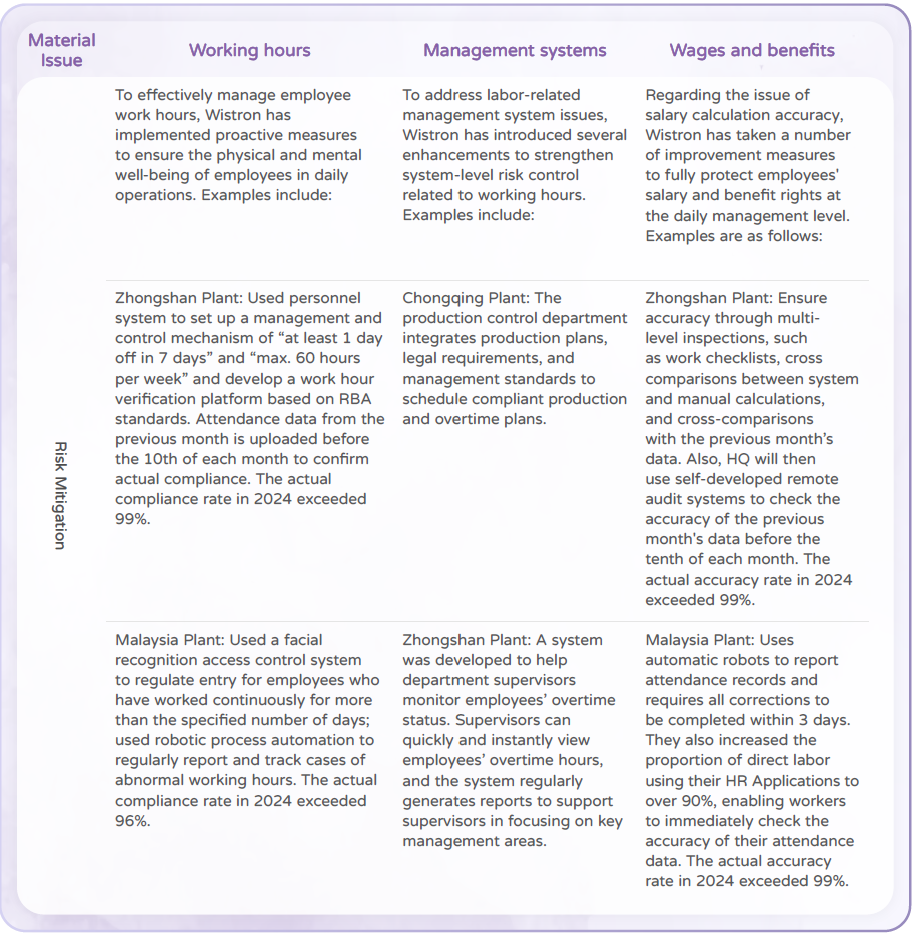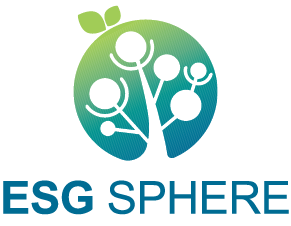Human Rights Risks and Material Issues
As a member of the global electronics industry supply chain, Wistron has complied with various domestic laws and international standards since our inception. Across global locations, Wistron has implemented various levels of human rights management measures and continues to promote Responsible Business Alliance (RBA) audit certification. Through regular communication on strategic directions and work outcomes, Wistron ensures a consistent management framework and compliance standards for addressing human rights issues globally (please refer to the Wistron Human Rights Due Diligence Management Report). In 2024, five plants - Hsinchu, Chengdu, Zhongshan, Vietnam, and Malaysia - successfully completed the RBA VAP (Validated Assessment Program) and all received Silver or higher ratings. In total, 25 manufacturing and business service locations completed the Self-Assessment Questionnaire (SAQ). With consistent and sustained efforts from our colleagues, no major human rights violations occurred in any Wistron locations around the world in 2024.
Passed the VAP certification
Adopted the Self-Assessment Questionnaire (SAQ)

Human Rights Risk Assessment
To address major human rights issues of stakeholder concern, Wistron initiates a thorough review of policies and internal regulations to ensure the comprehensiveness of management measures. Additionally, we set annual performance goals and regularly track progress of relevant work plans. Continuous adherence to the RBA framework guides daily operational audits, with responsible departments tasked to launch improvement plans for identified deficiencies to ensure that relevant human rights risks are effectively controlled and mitigated.
In 2024, Wistron continued its human rights risk assessments, analyzing RBA audit reports from 2022 to 2024. Among all identified deficiencies, approximately 2.07% were classified as medium or high risk, with labor-related issues comprising the majority at 73.47%. Key labor concerns, in order of importance, included "working hours," "management systems," and "wages and benefits." A summary of related risk mitigation and remedial measures is shown in the table below. For details, please refer to Wistron Human Rights Due Diligence Management Report. The mitigation and remedial measures listed in the table were collected and communicated through the global ESG action information platform. After reaching consensus and resolution, they were shared and rolled out across all Wistron sites. Progress is regularly reported to ensure relevant management principles and standards are implemented faithfully.
Other Major Human Rights Issues
Forced Labor
Wistron's human rights policy strictly prohibits any form of forced labor, including human trafficking, coercion, slavery and other forms of involuntary labor. Employee work contracts are formulated and signed in compliance with local laws and regulations. Employees have the right to terminate their labor contracts, and there are no restrictions beyond the terms of their contract that limit the relationship between employees and Wistron, such as withholding deposits or identity documents. Through the implementation of various human rights management measures, no instances forced labor or occurred in any of Wistron locations in 2024. There were also no medium- or high-risk forced labor issues identified during the audit process.
Human Trafficking
Wistron's human rights policy strictly prohibits any form of forced labor, including human trafficking, coercion, slavery and other forms of involuntary labor. As part of our internal control, we have established the “Anti-Slavery and Human Trafficking Management Procedures,” which provide clear guidelines for personnel recruitment, hiring, task assignment, and company management activities, ensuring no use of prisoners, debt laborers, or other workers under forced constraints. Human resources units are responsible for verifying personnel files and work records; if any anomalies or suspicious cases are detected, they are immediately reported to the responsible supervisors and appropriate protective measures are taken. Our suppliers, contractors, joint ventures, and domestic and international labor agencies are also required to strictly comply with our human rights policies and related management regulations. If any illegal activities are confirmed (through interviews, whistleblowers, media reports, or regulatory sanctions), Wistron will immediately terminate business relationships and report to the authorities. In 2024, no cases of human trafficking occurred at any Wistron locations, nor were any medium- or high-risk human trafficking issues identified during audits.。
Young Workers
Wistron's human rights policy expressly prohibits the use of child labor, and Wistron has taken proactive actions to uphold human rights policies and guidelines in daily management and ensure the protection of the rights and interests of young workers. For example, during onboarding interviews, we work with government agencies to ensure that the age of applicants complies with legal requirements. We require labor agencies to verify the identity and qualifications of applicants, and include the quality of this verification process as a key item in service evaluations, serving as a critical factor in decisions regarding contract renewal or termination. We also regularly communicate with all hiring managers across plants to reinforce the legal minimum age for recruitment and regulations prohibiting overtime and night shifts for underage workers. Through the implementation of various human rights management measures, the proportion of medium- to high-risk findings related to young workers in 2024 was 0.14%, down from 0.17% in 2023, indicating effective control.
Non-Discrimination
Wistron’s Human Rights Policy ensures equal employment opportunities for all individuals and prohibits all forms of discrimination. We are committed to evaluating employees based on competency and contributions to ensure equal rights and opportunities. To ensure Wistron’s supervisors and employees are conscious of corporate sustainability issues, the Company requires new employees to complete training courses such as "Corporate sustainability and social responsibility policy (including human rights policy)" and "Corporate sustainability course (basic)" that cover issues such as equitable recruitment, sexual harassment, human rights violations, discrimination, etc. The total training hours at all Wistron locations in 2024 reached 44,620 hours, with 87.4% of total employees trained. Relevant systems and regulations are announced on the Company's internal website for employee access. Through consistent advocacy and efforts, no discrimination in violation of company policies occurred in any of Wistron locations in 2023. There also no medium- to high-risk anti-discrimination findings identified during audits.


Wistron has formulated the "Non-Discrimination and Anti-Harassment Policy"
Anti-Harassment
Wistron respects the freedom and rights of all employees and has established an open platform for expressing opinions and problem reporting channels at all locations around the world to fully understand employees’ needs and expectations on issues such as working conditions and workplace environments. Employees can express their suggestions or ask questions in confidence and without fear of retaliation. To address sexual harassment concerns, the Company has formulated independent management measures and incident handling procedures, set up dedicated reporting hotlines, mailboxes and other reporting channels, and ensured the privacy and personal safety of reporters through clear accountability regulations.
In addition, the Company organizes lectures from time to time to invite experts to share and promote issues concerning self-protection and rights. We also set up medical centers or invite doctors to regularly offer counseling services to our employees. Through a range of proactive and responsive measures, Wistron continues to foster a harassment-free workplace.
Freedom of Association
Wistron's human rights policy respects employees' right to freedom of association and is committed to providing a channel and environment for expression of opinions. In global operating locations, employees can leverage organizations such as labor unions and employee relationship promotion committees. Department representatives help colleagues express their opinions in meetings to safeguard employee welfare and workplace safety. The percentage of employees joining labor unions at Wistron’s global locations is shown in the table below. In 2024, the
percentage of employees covered by collective agreements was 9.98%. For employees not covered by collective agreements, we negotiate working conditions and employment terms through labor-management meetings in accordance with local regulations. Furthermore, we maintain comprehensive and diverse communication channels to ensure that all employees are heard and action is taken..
Living Wage
In 2023, the Company issued "Wistron’s Commitment to Living Wage," affirming that the compensation and benefits provided not only comply with local laws and regulations but also exceed the legal minimum wage. The Company conducts regular salary surveys activities. Wistron uses the Anker living wage methodology to establish Wistron’s living wage calculation formula and data, mainly referring to Cost of Living and MIT-Living Wage Calculator and other methodologies. The calculation items include expenses such as food, clothing, housing, transportation and education, and the data are regularly confirmed and calibrated. All the actions aim to actively encourage the Company, suppliers, and contractors to meet living wage standards of various regions.
Human Rights Concerns of Other Stakeholders
Suppliers/Contractors
Wistron has established a comprehensive supply chain sustainability management process, which consists of five major steps: adherence to sustainability norms, sustainability risk assessment, sustainability assessment, support for improvement and capacity building, and preference and exclusion mechanism. These steps ensure that suppliers comply with our supplier code of conduct. Through sustainability risk assessments, Wistron reviews suppliers for major incidents or legal violations related to social issues, such as breaches of labor rights, occupational safety, or forced labor, and evaluates potential negative social impact factors, including wages below living wage standards or adverse effects on local communities. In the 2024 supplier sustainability audit, 8% of non-compliance cases were related to “Human Rights and Labor Protection,” primarily involving issues of “working hour management/ anti-discrimination.” Key improvement measures included:
- Establishing diversified monitoring mechanisms to ensure working hour arrangements comply with legal requirements; Providing training on working hour systems for employees and managers to promote a balanced approach to work and life.
- Organizing anti-discrimination training and incorporating it into our annual training plans to ensure all employees understand and are aware of related issues; Maintaining training records to facilitate the tracking of implementation progress and effectiveness.
Customers
In the area of products and customer engagement, Wistron’s material issues primarily concern corporate governance and ethical business practices. Potential risks include violations of environmental, health, and safety-related laws and regulations, as well as failures to implement preventive and detective compliance activities within the internal control system. Customers expect Wistron to align emergency response plans with international standards and regulatory changes across jurisdictions and to establish robust occupational safety management programs to reduce workplace risks for workers. A summary of Wistron’s risk mitigation and response measures is as follows:
- Regular regulatory audits
- Implement international standards such as ISO 45001 and ISO 14001 for occupational health and safety, environmental policies, and management systems, with ongoing efforts to ensure effective operation
- Regular review of existing systems and personnel to address and enforce regular audits and encourage personnel to comply with regulations
- Provide training on emergency response procedures
- Establish emergency response management procedures
- Undergo third-party external audits for validation
Community
With regard to communities, Wistron’s material issues are mainly related to social participation. Potential risks include failure to align site-level social investment with ESG policies and the lack of proper planning for community investment and charitable giving. Communities expect Wistron to fully integrate corporate resources to generate meaningful social impact. A summary of Wistron’s risk mitigation and response measures are as follows:
- 1. Implement a system for compiling information so that offices and factories worldwide may regularly upload and review community development investment plans and implementation results. Compiled information will then be reported in the annual ESG report
- Develop and implement charitable donation and sponsorship guidelines, ensuring adherence and regularly reviewing execution results
Risk Mitigation














